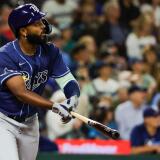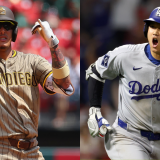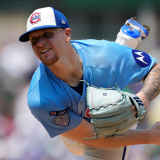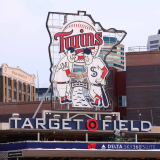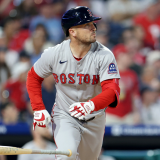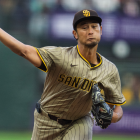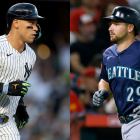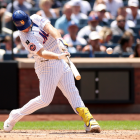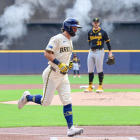Awards Watch: Shohei Ohtani hasn't been the most valuable player in the NL, so why does the MVP race feel done
The race may not be as much of a foregone conclusion as it seems
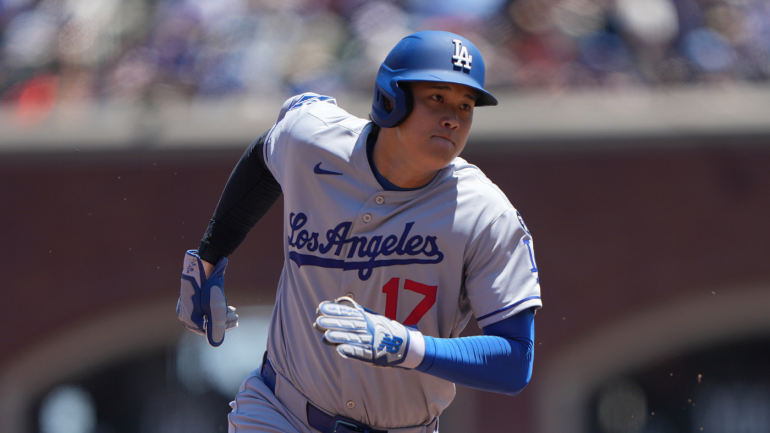
ATLANTA -- Why does it seem like the race for the National League Most Valuable Player is over? Why do so many people think it's such a foregone conclusion? Is it driven by narrative? Star power?
Pretty much everyone believes Shohei Ohtani is going to win the NL MVP. Just look at the odds, via DraftKings:
- Ohtani -1100
- Pete Crow-Armstrong +700
- Juan Soto +2000
- Kyle Tucker +5000
If you go by those odds, the race is over and it isn't even worth a discussion. And, hey, Ohtani would be a deserving winner. Given his two-way exploits, it's an easy argument that he's the best baseball player in the world right now.
Has he truly been the most valuable player in the National League so far in 2025 though?
I'm dubious. In fact, gimme PCA right now.
Ohtani is obviously one of the best offensive players in the league. He won MVP last season, deservedly so, while serving only as a designated hitter. That's how valuable he is on offense. And the thought process behind him being so far ahead in MVP discussions this season is that he's taking that offensive value and adding back the pitching side.
To this point, though, Ohtani has pitched nine innings. That's it. He's been great in those nine innings (1.00 ERA, 0.4 WAR), but how much value is truly derived from nine innings on the mound in 97 Dodgers games?
So we're left looking at a DH -- an excellent DH; the best in baseball! -- with nine added innings of pitching value. He leads the league in runs, home runs, slugging and OPS.
But back when Ohtani was a full-time two-way player, the arguments for him to win MVP were, correctly, concentrating on his value both on offense and in run prevention. The latter this season, again, comprises of nine innings of work.
Meanwhile, there's an argument to be made that Pete Crow-Armstrong is the best position player in baseball if we eliminated hitting. That is, looking at just baserunning and defense, he might well top the charts. He's exceptionally good on defense, covering seemingly more than half of the Cubs' outfield, running balls down in the gap with relative ease. Ohtani doesn't play defense. And while Ohtani was the first-ever 50-50 guy last season, he has 12 steals this year compared to Crow-Armstrong's 27.
So let's consider hitting. Specifically, is Ohtani that much better at PCA to overcome the massive gap on defense/pitching and the modest gap in baserunning? Let's look:
Ohtani: .276/.382/.605, 174 OPS+, 12 2B, 7 3B, 32 HR, 60 RBI
PCA: .265/.302/.544, 140 OPS+, 21 2B, 4 3B, 25 HR, 71 RBI
Ohtani's a better hitter. That isn't really in question. But is the gap really that vast? Because PCA is clearly a better baserunner and provides significantly more value on defense than Ohtani's nine innings pitched.
It's difficult to try and calculate how everything adds together, but there is a number. It's WAR. Now, yes, I'm aware that WAR is polarizing. No one should ever use it to say a player is definitely better due to being something like a 0.1 lead in WAR. There's a margin of error. It is, however, an attempt to drill down a player's value to a single value. Look at the story it tells here when it comes to Ohtani vs. PCA in 2025.
FanGraphs WAR
PCA: 4.9
Ohtani: 4.3
Baseball Reference WAR
PCA: 5.2
Ohtani: 4.3
The main distinction between the two calculations is which defensive metrics they use, which explains the difference in Crow-Armstrong's number. Regardless, those aren't really within the margin of error.
What's the bottom line? Well, Ohtani is the better hitter, but PCA is an elite defender and baserunner and isn't that far behind in hitting. WAR says PCA has been more valuable this season and so do my eyes. So why does everyone think this is such a foregone conclusion?
It shouldn't be. It should be a race. And I'm taking PCA right now.
![[object Object] Logo](https://sportshub.cbsistatic.com/i/2020/04/22/e9ceb731-8b3f-4c60-98fe-090ab66a2997/screen-shot-2020-04-22-at-11-04-56-am.png)


